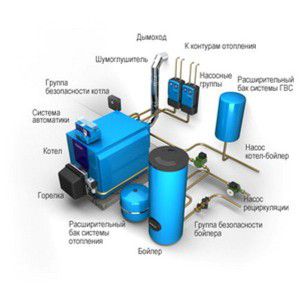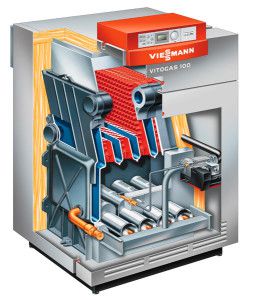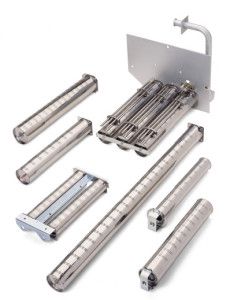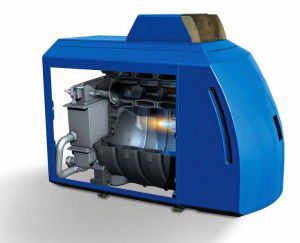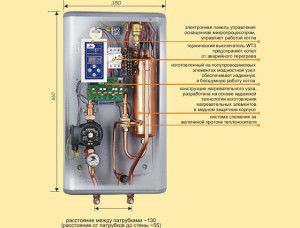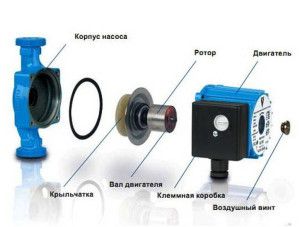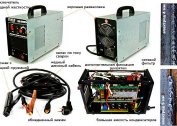The selection of components of the heating system is a key task in the design. Their operational parameters must correspond to the calculated ones, and the control is quite simple and as automated as possible. How to choose household boilers and pumps for heating: gas, diesel, electric boilers? First you need to find out their purpose and features of the work.
Key heating components
The principle of operation of any autonomous heating system is to heat the water to the required level and transport it to radiators and batteries. The first task should be performed by household gas burners for heating or similar devices. To increase the speed of the coolant, circulation pumps are installed.
This scheme should ensure the normal operation of heat supply. In practice, it is necessary to choose the right household pumps for heating and boilers, based on the actual parameters of the future system. For this, the following factors are taken into account:
- TDP heating. Depends on the heat loss of the building, its volume and climatic features of a particular region;
- Heat carrier volume;
- Characteristics of radiators and batteries - thermal return;
- Type of system - closed, with forced circulation, gravity, etc.
These data are calculated and are calculated first. According to the figures obtained, optimal household gas heating boilers and other heat supply components are selected.
System characteristics may change during its operation. Therefore, when calculating, you should lay a small margin in all parameters 10-15%.
Domestic heating boilers
What is impossible without any autonomous heating system? Her "heart" are boilers that provide heating medium to the desired level. Despite the structural differences, they all have one common element - the zone of increase in the temperature of the coolant.
The choice of the boiler begins with the calculation of its characteristics - power, required functionality. You also need to pay attention to quality and manufacturer. Each type of heater has a specific life. So, household diesel heating boilers need periodic cleaning of nozzles. Otherwise, they become clogged and, as a result, deterioration of the fuel combustion parameters.
The main characteristics of boilers are:
- Rated power;
- Type of fuel used - gas, angle, firewood, diesel or alternative options (solar collectors, geothermal systems);
- Additional components - expansion tank, circulation pump, controls and safety.
If it is possible to connect to the gas transmission line - choose household floor-standing gas heating boilers. In most cases, they satisfy all of the above requirements. An alternative to them are solid fuel, electric or diesel models.
Each type of boiler has special installation requirements. You can find them in the instructions for the specific model.
Gas heating boilers
Despite the constant increase in gas prices, it is still the cheapest type of fuel. Any household gas heating boiler consists of a combustion chamber, a heat exchanger and additional components.
For the organization of autonomous heating, the best option is to purchase a gas boiler.Its parameters were calculated by professional engineers, and the material of manufacture in most cases meets modern requirements. However, it is possible to upgrade an old solid fuel boiler. To do this, you need a domestic gas burner for heating.
It is a separate unit installed in the combustion chamber. During its operation, heat energy will be transferred from the combustible gas to the boiler heat exchanger. But this should take into account the specifics - not all gas burners for domestic heating boilers can be installed in the old design:
-
Mounting overall dimensions should coincide with similar camera parameters;
- The power of gas burners for domestic boilers is calculated for a specific model. Otherwise, the heat exchanger will burn out;
- Depending on the type of gas (main or liquefied), a set of adapters for the operation of the burner is selected.
If any of these requirements is not met, you should consider purchasing household floor heating gas boilers. They are adapted to work with both main and liquefied gas. They also have a high degree of reliability. But in addition to the technical parameters, attention should be paid to the cost of gas burners for domestic heating boilers. It is significantly lower than that of boilers.
| Model | power, kWt | Cost, rub. |
| Boilers | ||
| ATON Atmo 10E | 10 | 12340 |
| Euroterm KT 20 TB | 20 | 17760 |
| Ross Lux AOGV-24 | 24 | 23240 |
| Gas-burners | ||
| LAMBORGHINI EM 3-E.D1 | 17 | 22000 |
| Weishaupt WG 20 N / 1-C | 120 | 202800 |
Also, domestic gas heating burners are used to modernize boilers. Modern models have multi-stage adjustment and reliable protection.
It is best to purchase a household gas boiler with the maximum configuration - a pump, an expansion tank and a safety group. So you can optimize the costs of organizing autonomous heat supply.
Diesel heating boilers
This type of heating equipment is used if it is possible to purchase fuel at an affordable cost. The principle of operation of domestic diesel heating boilers is in many ways similar to the operation of a similar vehicle power unit.
The fuel goes through a preheating step to reduce viscosity. Then it is fed into the nozzle, where air is pumped with the help of a pump or turbine. The resulting mixture ignites and heats the boiler heat exchanger. Thus, the transfer of thermal energy to hot water occurs.
Unlike domestic floor-standing gas heating boilers, diesel-powered models have a number of operating features:
- It is necessary to carefully check the composition of the fuel. The presence of essential oils or alcohol-containing components in it is not allowed. It is also recommended to pre-filter the fuel before feeding it to a domestic diesel heating boiler;
- Special requirements apply to the place of fuel storage. Tanks must be airtight.
Diesel units have analogues of gas burners for domestic heating boilers. They can be installed in an existing design. The performance requirements for diesel burners are the same as for gas ones.
It is recommended to purchase diesel burners that are capable of using recycled oil.
Electric heating boilers
If the house does not have a gas pipeline, and the organization of diesel heat supply is unprofitable, household electric heating boilers are installed. They differ in the possibility of smooth power adjustment, have a slight inertia of work, and can also be part of a small heating system.
There are currently several types of household electric heating boilers on the market. The main difference between them is the method of heating water:
- TENY. They work due to the resistive effect when a thermocouple with high resistance generates heat when a current passes through it;
- Electrode. Heating occurs due to the splitting of water molecules into electrons and ions. They move to electrodes of reverse polarity, thereby increasing the temperature of the medium;
- Induction. Use the phenomenon of electromagnetic induction. The created field between the core and the winding increases the temperature of the coolant.
Each of these types of domestic heating electric boilers has its own advantages and disadvantages. For small systems, electrode models are recommended. However, they need a special coolant composition. Traditional models with heating elements have proven themselves in the composition of heating houses of medium and large area.
For a boiler with an open heating element, it is mandatory that once every 2-3 years it is descaled.
Household pumps for heating
To increase the flow rate of the coolant, domestic circulation pumps for heating are needed. Their parameters are calculated in advance for a specific heat supply system. Structurally, domestic heating pumps consist of a power unit and a rotating impeller.
To choose the right model, you need to know the main parameters of the circulation pump. The determining one is the power of its power unit. In fact, the performance of this heating element depends on it.
In addition, you should pre-calculate the following characteristics of a household circulation pump for heating:
- Performance. The amount of coolant volume passing over a certain period of time - m³ / hour;
- Pressure. Determines how high a column of water can lift when the pump is running - m.
Recently, this heating element is found not only in closed, but also in open systems. Thanks to the circulation pump, the heat distribution between radiators and radiators is normalized.
It is important to remember that both the pump and the heating boiler must form a unified heat supply system at home. Therefore, their parameters are calculated in advance.
The video shows an example of calculating a pump for heating:
